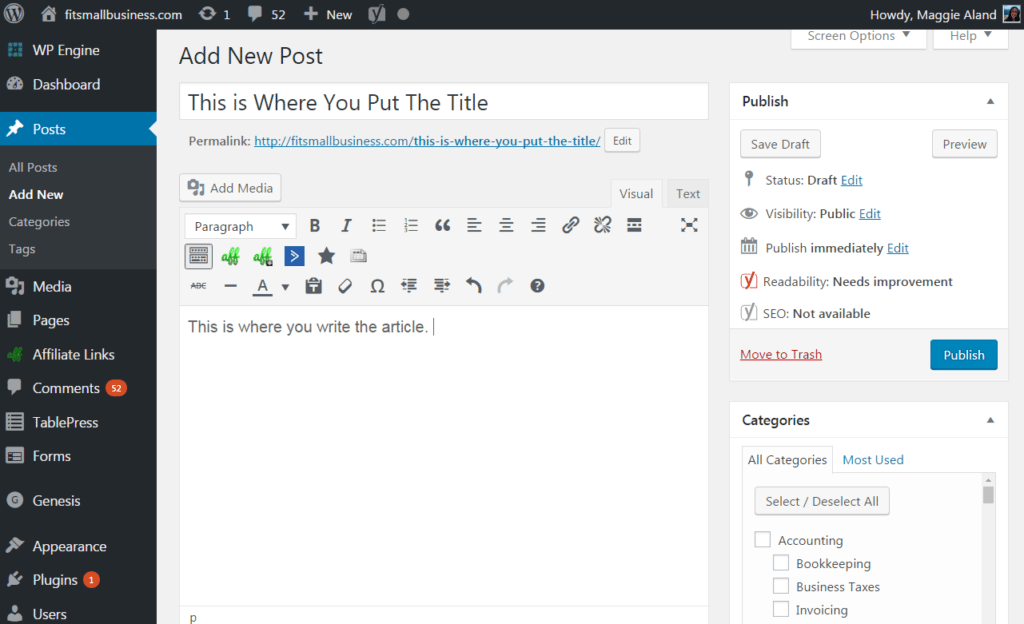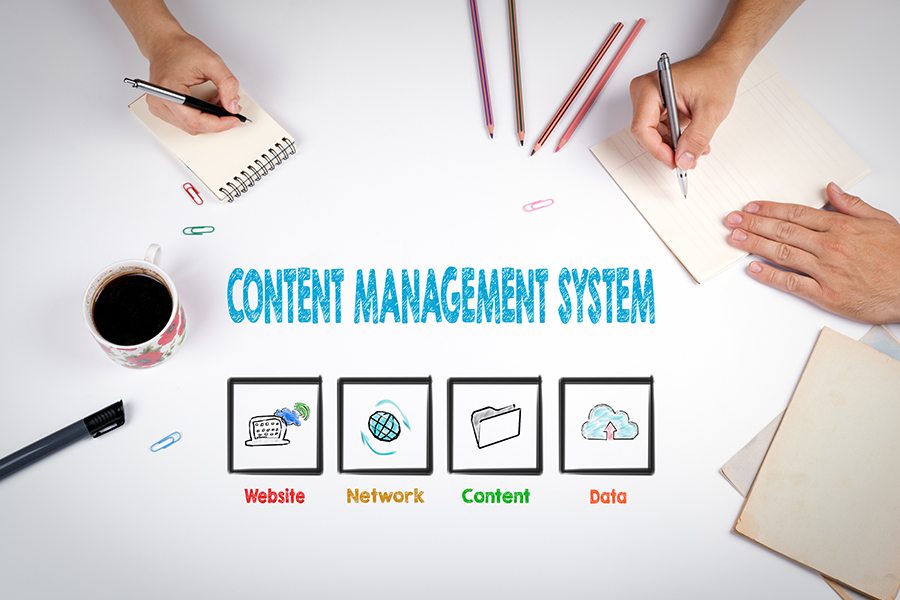Should you have to create a web site for your small business, event, or portfolio, you’re probably hearing the word CMS pop up during your study. That’s as a CMS, or content management strategy, can be an important part of making your site. In this article, we go over what a CMS is, the advantages and disadvantages of using a single, along with the top 3 hottest content management systems.
Here at Fit Small Business, we use the popular WordPress platform. Should you like what you see, then go on over to see our guide on How to generate a WordPress Website. There, we will show you how to have your site up and running in just a few easy steps–without breaking the bank to do so!
What is a CMS?
A CMS (Content Management System) is a computer software or set of similar apps which may be used to make or, as its name suggests, handle digital content. This is done by editing, adding, or deleting content that is to be printed on a site.

Backend of WordPress — A Popular CMS
Exactly what Does a CMS Allow You To Do?
Most CMS programs consist of web-based publishing, format management, history editing and version control, indexing, search and retrieval. By the character of a CMS, the program supports the separation of content and presentation. CMSs are capable of creating and editing articles, and allow you to administer users and assign various permissions to every.
Pros and Cons of Using a CMS
When deciding Whether a CMS is the Perfect match for your website, think about the following pros and cons:
Pros
1. Content Testing is Distinct from Design
Your content editing is distinct from the design and functionality of the website, so users who are not technically trained can include , format and edit their articles on the site without needing to fiddle with coding and design.
2. Selective Access Permissions
Every user can have selective access permissions according to their functions, such as author, editor, contributor, administrator, etc.. You may opt to let some users to edit and add their own content while giving others universal accessibility. This helps to maintain security since contributors can have restricted access.
3. Speedy Updating
Website updates are quick and effortless when using a CMS. Even when using the administrative interface, elements like menus, headers, footers and sidebars can be easily (and fast ) updated.
4. SEO-Friendliness
CMSs are very SEO-friendly. They could incorporate custom page titles as well as metadata and adjustable URLs. Helper plugins are also available if you want tips about the best way to optimize your content.
5. The Most Popular Options Are Free
And here’s the best part, the simple framework of most CMS apps are free. If that’s the scenario, you only have to pay more for further customization options, like a premium design or extra safety.
Cons
Since we have covered the benefits of CMSes, it’s only fair that we look at the pitfalls too.
1. Security Risks
There are hackers out there who can figure out how to split in the CMS platform. Nevertheless, this may be prevented by taking additional security precautions, like executing two factor authentication.
2. Difficulties in Design
Layout wise, it can be a struggle to transform your website into the specific way you want it. However, the right amount of expertise and ability needs to be able to overcome this barrier without much effort, however this might call for additional funds on your part.
3. Lagging Issues
CMSs tend to store aspects of a page separately, then they assemble everything once you request a webpage. This could result in some lags, but can be mitigated by using strong and efficient caching.
4. Functionality Limitations
Additionally, there are performance limitations. There are some processes that a CMS cannot manage without having to rewrite code. This will only affect you if you’ve got special functionality needs. Do not forget to look up everything you need to accomplish to assess its feasibility.
3 Top Content Management Systems (CMS) for Your Small Business
Following is a listing of 3 of the best CMS apps and how they hold up against every other.
1. WordPress
The first is WordPress, the hottest content management system (and that which we use here in Fit Small Business). While this is primarily a blogging platform, plenty of non-blogging websites have come up from WordPress, from straightforward multi page brochure style sites to stores to full-fledged social websites.
In WordPress, you’ll find thousands of themes for your site, not to mention the various plugins you can use to extend your site’s functionality. It’s clear why this is a popular selection for those who wish to make their own websites.
WordPress has a huge community of developers with a great deal of tutorials and documentation available if you ever need help. Additionally, it is free to download, however you will need to pay for hosting ($2.95 a month with Bluehost). The tens of thousands of plugins available as well as technical themes make it possible to create just about any kind of site! The dashboard is also user friendly as it comes to managing content.
The cons are it is hard to work with than a website builder, though it’s still probably the simplest CMS on the market. The standard setup has some safety issues, and without additional safety measures, it can be exposed to attacks.
Discover how to make a WordPress site using our step-by-step tutorial.
2. Joomla
The Upcoming top CMS is Joomla. Prominent companies such as MTV, Harvard University and IHOP utilize this for their websites. In addition, it is suitable for back end programs also. Citibank uses Joomla for just that purpose. This CMS had been used for everything from inventory management systems to your everyday run-of-the-mill sites.
With more than two hundred million consumers and subscribers, Joomla has a long development history as well as a very active development commission, so in the event that you want tutorials or advice, you can easily find it. Should you need add-ons and plugins for this CMS, that is also offered.
However, Joomla is not as user friendly and doesn’t have as large quality themes as WordPress.
3. Drupal
Drupal, which is just another very popular CMS that has been utilized by many of high profit businesses such as the New York Observer, Popular Science, MIT, Sony Music, Fast Company, and lots of more. Drupal has plenty of features for constructing external and internal websites as well as a ton of tools to help organize your content.
Drupal has a very active community with quite a few forums, and even face to face events. There is even community generated instruction that’s always being updated and improved. This documentation includes all you’ll want to learn about installation, building sites, modules, and so much more.
Drupal can be overkill for simple websites with its substantial amount of features. There is also a scarcity of quality, free themes, so you will probably have to purchase one in the event that you want your site to look nice. Last, the theme system is fairly complicated compared to the likes of Joomla and WordPress.
Frequently Asked Questions
What is a theme?
A motif changes the design of your site, without messing with the mechanics of the site. A fantastic theme will give your website a polished and tidy appearance, which will impress your website visitors.
What is a plugin?
Plugins extend the performance of a website. While a CMS can’t do certain things on its own, such as possess a pop up screen in your webpage, or gather email addresses from website visitors, you can download plugins with this type of functionality. Since there are thousands of plugins, your CMS has almost unlimited capacities.
What is two factor authentication?
This provides your site an extra layer of safety. By using another factor besides your own password to get into the back end of your website, you make it tougher for hackers to access your site.

